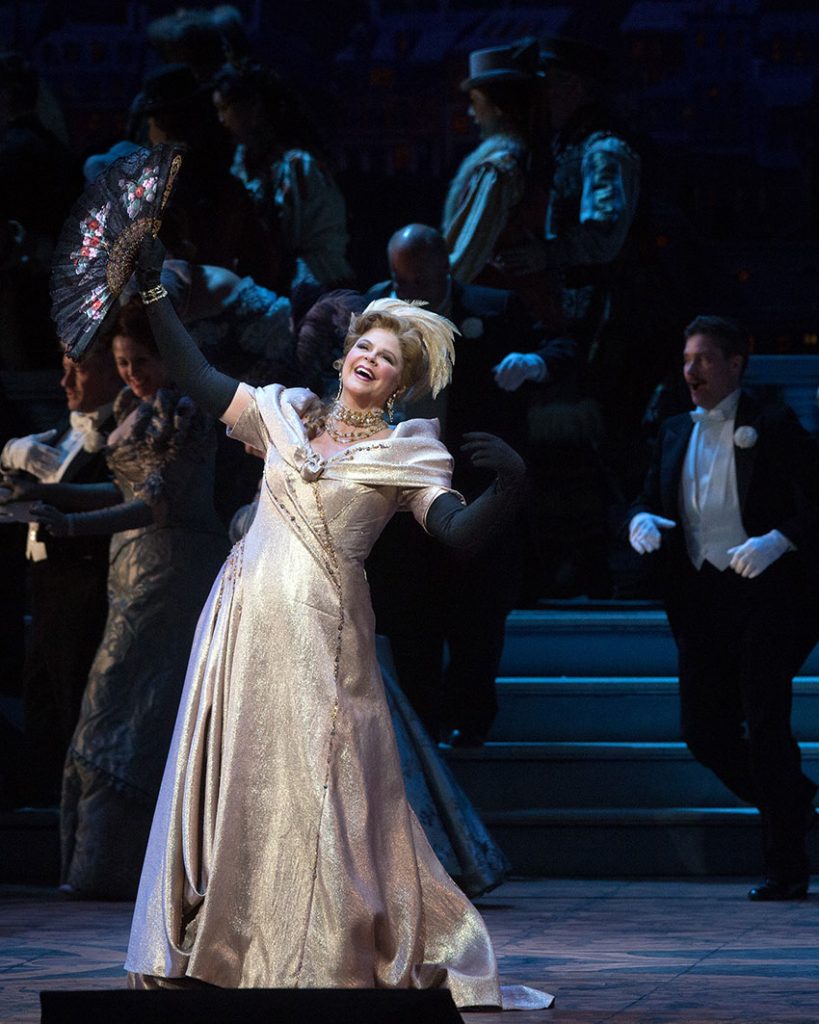The Merry Widow (Die lustige Witwe) is Franz Lehár’s romantic comedy operetta (opera with spoken dialogue). It premiered at the Theater an der Wien in Vienna, Austria in 1905.
Franz Lehár (1870 – 1948) was an Austro-Hungarian composer known for his operettas. The Merry Widow is his most popular.
The librettists were Leo Stein and Viktor Léon.
The Merry Widow Story
The story is set in 1900 Parisian society, and Pontevedro, an imaginary Balkan country with some resemblance to Montenegro in the former Yugoslavia.
Baron Mirko Zeta and his wife Valencienne are the Pontevedrian ambassadors.
Camille de Rosillon is a young Frenchman flirting with Valencienne.
Hanna Glawari is a wealthy Pontevedrian widow looking for a husband.
Danilo Danilovitch is a womanizing aristocrat who the Baron wants to marry the widow Hanna so her money will stay in the country.
Act I – The Ball
Baron Mirko Zeta, the Pontevedrian ambassador, is giving a ball at the embassy. He hopes is hoping to raise money for his bankrupt country.
Young Frenchman Camille de Rosillon flirts with Baron Zeta’s wife Valencienne by writing “I Love You” on her fan.
Widow Hanna arrives to much excitement. Valencienne realizes she has lost her fan and goes looking for it.
Aristocrat Danilo talks with Hanna telling her that though they were once in love, he is not interested in marriage and will never say, “I love you.”
Baron Zeta orders Danilo to marry Hanna. Danilo says he will not, but will keep the Parisian men away from her.
Danilo and Hanna dance.
Act II – The Villa
Widow Hanna hosts a party later at her villa. Danilo’s assistant reports that Frenchman Camille is in love with an unknown woman. Baron Zeta asks Danilo to find out who it is so he can keep Frenchman Camille away from Widow Hanna.
Widow Hanna thinks the fan is a gift from Danilo.
Camille and Valencienne find the fan and she writes “I am a respectable wife” on it. When Baron Zeta arrives Danilo’s assistant delays him and sneaks Widow Hanna in. She emerges with Frenchman Camille who announces their engagement.
Danilo gets mad and leaves. Hanna thinks Danilo is in love with her.
Act III – Maxim’s
The party is raging. Danilo forbids Hanna from marrying Camille.
The fan shows up. Baron Zeta recognizes that it is his wife’s. He declares himself divorced and proposes to the Widow Hanna.
Hanna says that according to her husband’s will, she will lose her money if she remarries. The men lose interest except for Danilo who asks Widow Hanna to marry him.
Widow Hanna accepts and explains that if she remarries, all her wealth passes to her new husband.
Valencienne shows Baron Zeta the other side of the fan, and the couple is reunited.
The Merry Widow 2017
This is the Metropolitan Opera’s Susan Stroman production of the English version by Jeremy Sams.
The Merry Widow Cast
Ward Stare conducts.
Hanna Glawari
Susan Graham
Valencienne
Andriana Chuchman
Danilo
Paul Groves
Camille de Rosillon
David Portillo (before December 25)
Taylor Stayton (after December 25)
Baron Mirko Zeta
Sir Thomas Allen
The Merry Widow Performances
The Metropolitan Opera gives nine performances of The Merry Widow between Thursday, December 14, 2017 and Thursday, January 11, 2018.
December 2017 Performances
Thursday, December 14 at 7:30 pm
Saturday, December 16 at 8 pm
Wednesday, December 20 at 7:30 pm
Saturday, December 23 at 8 pm
Wednesday, December 27 at 7:30 pm (Taylor Stayton takes over the role of Camille)
Saturday, December 30 at 1 pm
January 2018 Performances
Tuesday, January 2 at 7:30 pm
Friday, January 5 at 8 pm
Thursday, January 11 at 7:30 pm
The Merry Widow Tickets
Tickets start at $25
[content_block slug=metropolitan-opera-tickets suppress_content_filters=”yes”]

